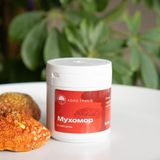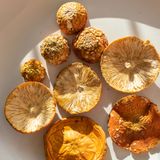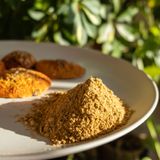Improving sleep with fly agaric
In the current realities of the world, stress and anxiety significantly impact the quality of sleep, which is crucial for our health. Sleep disturbances can lead to serious health problems. Therefore, researching methods to improve sleep is highly relevant today.
Stress and anxiety significantly affect sleep quality as they activate the body's "fight or flight" system, leading to an increase in stress hormone levels, such as adrenaline and cortisol. This can cause a range of physiological and psychological reactions that interfere with falling asleep and maintaining deep sleep. Here are a few ways stress and anxiety can affect sleep quality:
- Difficulty falling asleep (insomnia): High levels of stress and anxiety can hinder falling asleep, as your mind may be filled with thoughts or worries that keep you in a state of heightened alertness.
- Sleep disruption: Stress and anxiety can cause frequent awakenings during the night or too early awakenings, making sleep intermittent and less restorative.
- Decreased sleep quality: Even if you can fall asleep, a high level of anxiety can reduce the depth and quality of your sleep, limiting the amount of time spent in deep sleep phases, which are the most restorative.
- Nightmares or unpleasant dreams: Stress and anxiety can also cause unpleasant dreams or nightmares that may awaken you and complicate falling back asleep.
Scientists from Germany in 1996 studied the effect of muscimol (a compound from fly agaric) on sleep overall and its different phases. The experiments were conducted on mice.
The research showed that muscimol positively affects both main sleep phases: non-REM (NREM) sleep and REM sleep.
- "Non-REM" (NREM) sleep translates as "sleep without rapid eye movements," during which the body restores physical strength and performs many important regeneration functions.
- The term "REM" sleep means "sleep with rapid eye movements." This sleep phase involves rapid eye movements, increased brain activity, dreaming, and temporary relaxation of body muscles. REM sleep plays a key role in memory processes, learning, and emotional health.
Imagine that muscimol is a key that fits special locks in the brain called GABA receptors. When muscimol "unlocks" these locks, they allow a greater number of "calm" particles (chloride ions) to enter nerve cells. It's like pressing a "volume down" button for the brain: nerve cells become less active and less excitable. When the brain operates quieter, you experience less anxiety and fall asleep easier. It's somewhat similar to turning on "sleep mode" on your phone, helping your brain transition to a calm state, ready for sleep.
Muscimol positively affects both sleep phases, improving the inhibition of nerve activity, and enhances sleep by increasing the duration and quality of its phases, which is important for physical and mental recovery.
Muscimol is the active substance of the fly agaric, so to improve your sleep, consider a microdosing course of fly agaric.
The article is based on scientific research by Marike Lancel, Ph.D., Tatjana A. M. Crönlein, and Johannes Faulhaber, Ph.D. "The role of GABA A receptors in regulating sleep."
Available for purchase in our store.
For each client individually, we draw up instructions according to his indicators and requests
Monthly rate:
- Course for beginners Fly agaric whole/ground 50g+jewelry scales - 39$
- Fly agaric whole 50 g - 31$
- Fly agaric 60 capsules - 27$
- Fly agaric for 3 months 180 capsules - 57$
Read other articles on the topic of fly agaric:
- What is microdosing?
- The effect of fly agaric on stress and anxiety
- The chemistry of fly agaric and how it affects humans.
Contact us:

















































